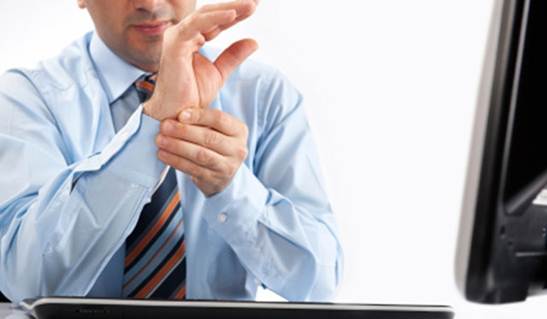People who do office works after a period time will usually
suffer from diseases such as eye strain, back pain, cervical vertebrae
degeneration, carpal tunnel syndrome, dull or dry skin, abdominal fat...
Without appropriate treatments and adjustments, these diseases will affect the
health very much.
1.
Eye strain
Working continuously with the computer will make your eyes
fatigable, dry or wet. Your eyes that have to regulate so much for a long time
easily have these above situations. Along with eye strain are dizziness,
headache and nauseous feeling. Computer waves damage the nervous system. Eye
strain also makes nerves tensile, and the stifling atmosphere of the office
will make you more stress.
If you want to end these situations, you should rest for
about 5 minutes after every 60 minutes of working with the computer. In that
leisure time, you close your eyes, relax your body and imagine living in a
place with beautiful scenery or listen to a melodious music.

Along with eye
strain are dizziness, headache and nauseous feeling
2.
Back pain, arm pain, degenerative cervical vertebrae
Sitting much with poor posture will make back muscles and
spine twisted and will lead to back pain. Typing the computer repeatedly and
clicking the mouse will cause the hand joints smart. The neck continuous in
motionless posture creates poor blood circulation, which will gradually lead to
osteoarthritis. That's the reason why the office workers easily have diseases
such as carpal tunnel syndrome (arm pain), cervical vertebrae degeneration,
sciatica. Useful tips for office workers are to adjust their posture rightly:
back straight, not sitting too deeply into the back of the chair. You’d better
find yourself the most comfortable and soft chair. Pay attention to the height
of a desk and chair to both your hands within reach of the desk. After 2 hours
working with your computer, you should stretch, twist, or practice a light
sport for circulation of blood. At the same time, you should massage yourself
the finger joints regularly to avoid aches and muscle spasms.

Back pain
3.
Nerve injury syndrome
Nerve injury syndrome is a thing that you may encounter.
When you turn your head to one side to hold the phone while both your hands
still work with the computer, you can get acute chest syndrome. It is due to
nerve plexus in the arm pinched. When you stretch your fingers and wrist
repeatedly or turn your forearm, the nerves will be pinched. You easily have
neural tube syndrome with symptoms such as discomfort from the elbow to the
base of the thumb or weak wrist.
4.
Abdominal fat
The belly of office men and women tends to be bigger than
usual, because they have few activities at sit posture, which make fat
accumulate in the abdomen more than normal. That's not to mention the
inactivity and excess calories also lead to obesity. Therefore, if your job
does not have to move much, try to take every opportunity to move. Instead of
the elevator, take the stairs... along with physical exercises.
5.
Diseases of skin and respiration
In the air-conditioned environment at the office, lacking of
fresh air, your skin and respiratory system will have problem. If you have
minor illness, your skin will be dehydrated, rough, dull color. If you have
serious illness, you will have rashes, allergies, dry mouth, difficult
breathing and respiratory infection. Drinking plenty of water, using
moisturizer and supplementing foods rich in vitamins A, C, E … are very
essential things for office workers because they have anti-aging effects,
restore moisture and elasticity to the skin cells. Sometimes, you try out room
to breathe fresh air to improve the above situation.
Your skin has to "work" all day, so the evening is
when you should take the time to "renovate" your skin by the mask and
massaging the skin. The mask will dilate the pores, help remove dead skin
cells, blood circulation and your skin will be soft and smooth.
6.
Carpal tunnel syndrome

Patients often
have to shake hands to ease discomfort
Patients have the painful feelings at the thumb, index,
middle and ring fingers and also feel numbness like tingling. Some patients may
feel pain at the wrist, palm or forearm, especially at night. The pain and
numbness sometimes spread up the forearm, which makes prehension become clumsy.
Patients often have to shake hands to ease discomfort. To prevent carpal tunnel
syndrome, the muscles need time to relax. Do exercises regularly especially for
those who sit a lot or perform the repetitive tasks at the wrist. When working,
you’d better sit in the correct posture, sometimes change positions or stand
up.